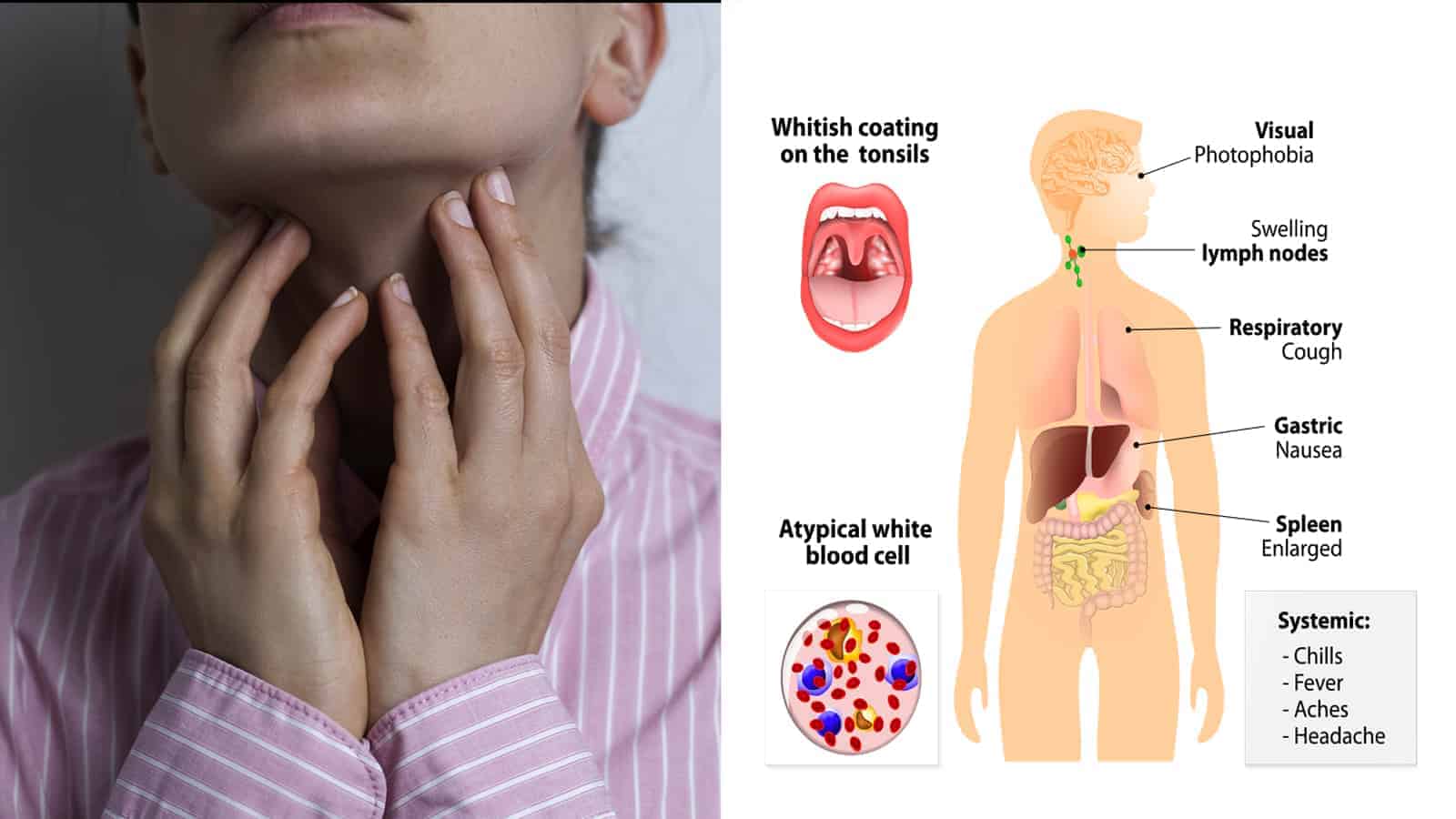Mononucleosis is also called “the kissing disease” because it’s transferred by saliva.
According to science, the first mention of this condition was in 1889 called glandular fever. It’s caused by either the Epstein-Barr virus (EBV) or the cytomegalovirus.
The most common age group to contract this virus is those between 10-35 years. However, it can be more severe should a person get this illness when they’re older. According to Health Research Funding, about 50 out of every 100,000 people in this country are infected with this virus annually. About 98 percent of the world’s population is estimated to carry the EBV virus, which is the mono’s main culprit.
While each case is different, people suffering from mono can take 2-4 weeks to recover, while some may have the EBV virus and have no symptoms. It takes some people more than six months to regain their strength. If you don’t feel better after a month, it can sign an ongoing issue with this virus.
It’s not uncommon for people with mononucleosis to develop chronic fatigue syndrome or chronic mono.
Mono can mess with your body, making you feel as if you cannot lift your head from the bed. It’s best to get plenty of rest and allow the virus to work its way through your system. There is no cure for this condition, so there’s no magic remedy to improve it.
Fifteen Signs That You Might Have Mononucleosis
There are some undeniable signs if you’ve been exposed to this virus or feel you may have it. Of course, many of these symptoms are the same as with other infectious conditions, so it’s essential to have a blood test to rule out or confirm mononucleosis. Here are the 15 most common signs of this illness.
 1. Fever
1. Fever
It’s typical for people with mononucleosis to have a high-grade fever that runs anywhere from 102 to 104 F. Of course, with that fever can come chills and weakness. Fevers may come and go during the duration of your body fighting this virus.
2. Debilitating Fatigue
One of the hallmarks of mononucleosis is debilitating fatigue. This exhaustion is not comparable to a lack of sleep from the night before. It’s an exhaustion that is so debilitating that you feel like taking a shower takes every ounce of strength you have.
3. Sore Throat With White Patches
A severe sore throat with white patches is classic with mono. In many cases, the soreness will move to the top of the throat, which prompts doctors to treat you for strep. If you have a severe sore throat, demand that your provider do a strep test as many are misdiagnosed when they have mono.
4. Swollen Lymph Glands
The lymph glands in the back of the head, neck, and armpits can become swollen and inflamed. They may be so sore that lifting your arms or moving your head may be discomfort. A heat compress can help to alleviate some of the pain.
Just know that your immune system is working overtime to fight the virus attacking your body.
5. Measles Like-Rash
A rash on the arms, face, chest, and torso is sometimes observed with mono. The inflammation is more like a heat rash; it shouldn’t itch or be painful.
6. Soft, Swollen Spleen
The spleen often swells as it helps to rid the body of the infection. You may be able to feel it being abnormally large and tender in the side of your liver area. You must be careful as the spleen can burst on rare occasions, especially if you try to do too much and it’s swollen.
7. Headaches
With the large swelling from the lymph nodes, it’s only typical that you would experience headaches. Headaches are usually one of the first symptoms to appear once you’ve been infected. They will last until the swelling in the lymph glands subsides.
8. Muscle Aches
Your muscles may throb like you have the flu when you’re dealing with mono. It’s a typical response from your body when fighting an infection. Many herbal supplements and essential oils can help with throbbing muscles until this condition passes.
 9. Liver Problems
9. Liver Problems
The liver is another organ that filters toxins through the body and can also be involved in this illness. If you should notice that you have yellowing of the eyes or skin, it’s a sign that your liver is not functioning correctly. Again, many things can cause liver problems, but mono is also a concern when dealing with this major organ.
10. General Illness That Won’t Go Away
Many people think they have the flu or have picked up a stomach bug. However, the long-lasting nature of this condition may cause you to believe something more serious is going on. A quick mono spot test can determine if you’re fighting the EBV virus and if it’s what’s causing you to feel so sick.
11. Dizziness
Since your lymph glands are pushing on the back of your neck, you may feel dizzy or lightheaded. It can also be caused by weakness and fighting the virus. Thankfully, this symptom will pass. Some excellent herbs can help with dizziness, like peppermint, clary sage, rosemary, and frankincense.
12. You’ve Kissed or Drank After Someone Infected
One of the giant red flags that you may have mono is that you’ve been around someone else who has it. It only becomes airborne if a person that is infected sneezes and the droplets mingle with your saliva. You can get it from sharing a drink with someone infected and kissing them.
You may think you’re in the clear, but developing symptoms can take four to six weeks. Also, know that you can also be a carrier of EBV and not have any symptoms. Remember that even after you feel well enough to go about your life, you can still have the active virus in your saliva.
You must be for a few months afterward to ensure you don’t infect others.
13. Chills
Many people report that they can’t get warm no matter what they do. The chills are a typical immune response as your muscles are squeezing, trying to warm the body. It’s common when you have a fever or other illness that leaves you down for the count.
14. Anxiety
One anomaly about this virus is that many people develop issues with anxiety and panic during the onset. It’s a strange phenomenon as the two aren’t connected. However, when the virus lingers and becomes chronic fatigue, it’s not uncommon to involve mental health aspects.
Additionally, since mono causes people to feel so horrible, it’s typical to worry about the possibility of more severe health issues. Most anxiety causes will resolve with the condition, but sometimes it becomes a disorder that must be managed as other ongoing problems.
15. Trouble Breathing
When there is swelling or infection in the throat and near the airway, it may cause problems with your breathing. Breathing problems are always serious and should be evaluated. Swelling can get out of control when an infection is involved, so these issues need to be monitored closely.
 Final Thoughts on Knowing the First Signs of Mononucleosis
Final Thoughts on Knowing the First Signs of Mononucleosis
Mononucleosis is a severe illness that can leave you down for the count. The Epstein-Barr virus most commonly causes it, but the cytomegalovirus can drive it in some rare instances. Since it’s transferred through people’s saliva, it’s best to never drink after anyone, even those you love.
In most instances, mono will subside on its own and will not cause any further difficulties. However, for some people, the condition may last beyond six months and become a lifetime issue. When this occurs, the illness can morph into chronic fatigue syndrome or chronic mono.
The EBV virus can become reactive during your lifetime whenever you face physical issues. Though it was once believed that you could only get mono once, it’s now been proven that you can contract this illness more than once in your lifetime. The EBV virus lies dormant in the body and can flare out of the blue.
This virus is often seen among teenagers and college-age students as there is a lot of kissing and sharing beverages. However, an older person can contract it, though it’s not as contagious among this crowd. It’s said that when someone older gets mono, it’s way worse on their body as they also don’t have the immunity to fight it off.
When it comes to being proactive, it’s essential never to share drinks and be selective about those you kiss. Parents caring for sick children should also take proper precautions as they can quickly spread the virus to you through coughing and sneezing.



















